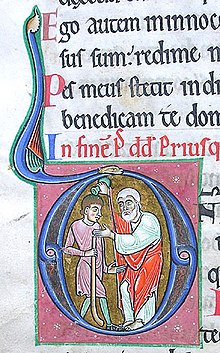| Psalm 26 | |
|---|---|
| "Judge me, O LORD; for I have walked in mine integrity" | |
 Samuel anointing David, illumination of Psalm 26 from the Saint Bertin psalter | |
| Other name |
|
| Language | Hebrew (original) |
| Psalm 26 | |
|---|---|
← Psalm 25 Psalm 27 → | |
| Book | Book of Psalms |
| Hebrew Bible part | Ketuvim |
| Order in the Hebrew part | 1 |
| Category | Sifrei Emet |
| Christian Bible part | Old Testament |
| Order in the Christian part | 19 |

Psalm 26, the 26th psalm of the Book of Psalms in the Bible, begins (in the King James Version): "Judge me, O LORD; for I have walked in mine integrity".
The Book of Psalms is part of the third section of the Hebrew Bible, and a book of the Christian Old Testament. In the slightly different numbering system used in the Greek Septuagint and Latin Vulgate translations of the Bible, this psalm is Psalm 25. In Latin, it is known as "Iudica me Domine".[1] The psalm is attributed to David by its sub-title.[2] Albert Barnes argues that "there is no reason to doubt the correctness of the superscription",[3] but according to Charles and Emilie Briggs, it is to be dated within the Persian period (539 to 333 BCE).[4] The Briggs describe the psalm as
a profession of integrity by a Levite, engaged in worshipping Yahweh in the temple choir. (1) He professes integrity in walk, and unwavering trust in Yahweh, as attested by Yahweh Himself (v.1-2). (2) Ever conscious of the divine kindness and faithfulness, he abstains from all association with the wicked (v.3-4). (3) He hates the company of the wicked and purifies himself for sacrifice (v.5-6). (4) He loves the temple (v.8), and stands in its choir blessing Yahweh (v.12) [4]
They add that the "elements of prayer and worship" in verses 9 to 11 are additions by a later editor.[4]
The psalm forms a regular part of Jewish, Catholic, Lutheran, Anglican and Nonconformist Protestant liturgies.
- ^ Parallel Latin/English Psalter / Psalmus 25 (26) Archived 10 October 2016 at the Wayback Machine medievalist.net
- ^ Psalm 26: New American Standard Bible
- ^ Barnes, A. (1834), Barnes' Notes on Psalm 26, accessed 20 October 2021
- ^ a b c Charles Augustus Briggs; Emilie Grace Briggs (1960) [1906]. A Critical and Exegetical Commentary on the Book of Psalms. International Critical Commentary. Vol. 1. Edinburgh: T & T Clark. p. 229.